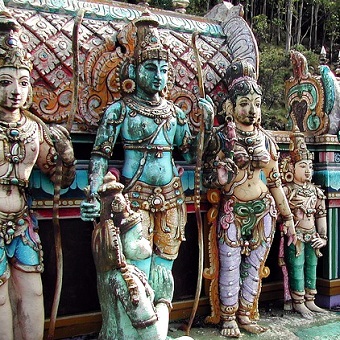THEOLOGY & APOLOGETICS
Hinduism and the Trinity
By Gary Meredith

In Hinduism, the world's oldest, most complex belief system, Brahman is the only supreme deity, the "Absolute." It is an impersonal power or way, beyond good and evil, not a personal being. There are thousands, even millions, of manifestations of Brahman, include the three leading Hindu deities of Brahma, Vishnu and Shiva — creator, preserver and destroyer — and many other gods and goddesses. Each may be worshipped, even animals and plants, though Hinduism does not require worship of any deity. Hindus may imagine their own Brahman in any way that works for them. The purpose of all Hindu practice is "enlightenment" with the ultimate goal to escape the endless cycle of birth-death-rebirth (reincarnation), and so to permanently lose one's identity and awareness (soul) by being absorbed into Brahman.
The following are just twelve of the many attributes that sharply distinguish the Holy Trinity from the Hindu trinity, and from virtually all the other religions ever devised by humans or demons (1 Timothy 4:1).
God is not part of his creation. Although his glory and attributes are reflected in all He has made (Psalm19:1-4; Romans 1:18-20), He is separate from his creation as an artist is separate from his painting. Therefore nothing else in all creation may be worshiped — not people, animals, trees, stars or planets — nor any other spiritual beings (Exodus 20:4-5; Deuteronomy 4:19).
God exists eternally ONLY as Father, Son and Spirit (Exodus 3:14, John 8:58; Hebrews 9:14). Each Person of the Godhead is fully God Almighty: Father (Ephesians 4:6), Son (John 14:9; Colossians 1: 15-19) and Spirit (Luke 12:10; John 4:24). Unlike Brahman, God does not manifest Himself as any other person or thing. No mere human can imagine Him as they please without violating reality.
God is infinite, and each Person of the Godhead is equally infinite. Father (Isaiah 55:8-9; Luke 1:37), Son (Isaiah 9:6; Matthew 28:18; Hebrews 1:3) and Spirit (Psalm 139:7; Matthew 12:28; 1 Corinthians 2:9-11) are equally omniscient, omnipresent, omnipotent — all knowing, all present, all powerful. To see the Son was to see the Father (John 14:9). Hindus wouldn't say that to see Shiva is to see Brahma; each presents only one limited aspect of the Absolute.
God is a personal Being, not an impersonal force. He has a personality — mind, will and emotions. For example, each Person of the Trinity can experience grief (Genesis 6:6-7; John 11:35; Ephesians 4:30).
God is love (1 John 4:8). Love is the most defining characteristic of the Holy Trinity: Father (Jude 1:1), Son (Romans 8:35), Spirit (Romans 15:30). God is not indifferent to those He created, He loves us enough to die for us (John 3:16), even the very worst of us (Romans 5:8).
God desires a personal, intimate, loving relationship with every human He has made. The personal relationship God desires is our adoption as his own children (John 1:12-13; 1 John 3:1). Father, Son and Spirit actually dwell within a Christian and "make their home with him." (John 14:16, 23; 1 Corinthians 6:19-20).
God requires all people to worship Him, and only Him (Exodus 34:14; Matthew 4:10). Hindus are not required to worship any deity, but are free to worship an unlimited number of deities.
God is holy, and requires all people to be holy, i.e., pure and sinless for their entire lives (Exodus 32:33; Matthew 5:48). Yet no human being can meet that requirement (Romans 3:23; 1 John 1:10).
God died to rescue all people from the penalty of their sins and allow them to live eternally in heaven (Hebrews 9:14; John 3:16; Romans 5:8; 6:23). No Hindu god ever died for all mankind; there is no need for a Savior in Hinduism.
The Son is the only way to eternal life in heaven (John 14:6; Acts 4:12). Hinduism accepts an infinite number of ways and paths to eternity which, as mentioned above, is oblivion, not heaven.
God has a unique plan and purpose for each and every human being (Jeremiah 29:11-13). He made this plan made before time began (Psalm 139:16; 2 Timothy 1:9). That plan is the only completely good and correct way for any person to live their lives and fulfill God's purpose in making them, which is to glorify God by becoming like his Son, and sharing his love and joy for eternity (Daniel 12:3; Matthew 25:21; Romans 8:28-30).
God wants to give you your true, unique, eternal identity, not absorb you into nothingness. We do not lose our identity in Christ, we finally become — fully and eternally — the person God created us to be. We will receive our true identity — our "new name" — in heaven (Revelation 2:17).
These and countless other attributes of our great Triune God and Savior make up the solid, glorious reality that clears away the vague mists of uncertainty offered by Hinduism and all the other non-biblical faiths of the world.
Image Credit: DEZALB; untitled; Creative Commons
Tags: Biblical-Salvation | Biblical-Truth | Other-Religions
comments powered by Disqus
Published 11-2-2015

